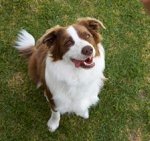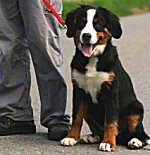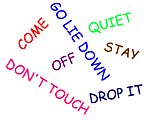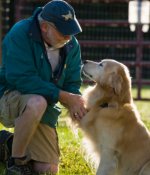German Shorthaired Pointers: What's Good About 'Em, What's Bad About 'Em
German Shorthaired Pointer temperament, personality, training, behavior, pros and cons, advice, and information, by Michele Welton, Dog Trainer, Behavioral Consultant, Author of 15 Dog Books
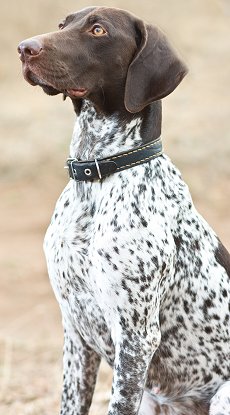
Good-natured and adaptable, but primarily bred to be a hunting dog, the German Shorthaired Pointer has a high energy level and belongs with an equally athletic owner who will take him running, biking, or hiking.
A walk around the block is barely a warm-up for a vigorous German Shorthaired Pointer. Too much confinement can lead to barking, hyperactivity, and destructive chewing.
Toward strangers he may be very friendly or somewhat reserved, so his alarm bark may be welcoming or mildly protective. But this is NOT an aggressive breed.
Most German Shorthairs are good with other pets, but some can be aggressive with strange dogs, and some are determined cat chasers.
Obedience training is a must for instilling self-discipline and control, for this breed can be a bundle of intense energy. Fortunately he is eminently trainable . . . but he does not obey blindly. Indeed, though the German Shorthaired Pointer can become focused when required to do so, he is easily distracted and does know his own mind and you need to be both patient and firm.
If you want a dog who...
- Is large, tautly-muscled, and athletic
- Has a sleek easy-care coat
- Thrives on vigorous exercise and outdoor activities
- Makes a sensible watchdog, but is good-natured and dependable with almost everyone
A German Shorthaired Pointer may be right for you.
If you don't want to deal with...
- Vigorous exercise requirements
- Rowdiness and exuberant jumping, especially when young or not exercised enough
- "Separation anxiety" (destructiveness and barking) when left alone too much
- Possible aggression toward other animals – chasing instincts
- A distractable mind of his own – tends to ignore calls and commands when an interesting sight or scent catches his attention
A German Shorthaired Pointer may not be right for you.
 |
Dog Breed Traits – Which Traits Are Right For You? In this brand new series, I'll help you decide which dog breed traits would best suit you and your family, your home and yard, and your lifestyle, so you can choose the best dog breed for your family. |
Keep in mind that the inheritance of temperament is less predictable than the inheritance of physical traits such as size or shedding. Temperament and behavior are also shaped by raising and training.
FREE eBooks by Michele Welton
![]() "Respect Training for Puppies" and "Teach Your Dog 100 English Words" are free step by step guides to teaching your pup to be calm and well-behaved.
"Respect Training for Puppies" and "Teach Your Dog 100 English Words" are free step by step guides to teaching your pup to be calm and well-behaved.
![]() "11 Things You Must Do Right To Keep Your Dog Healthy and Happy" is a free guide to keeping your dog mentally, physically, and emotionally happy and healthy so you can enjoy a longer lifetime of companionship.
"11 Things You Must Do Right To Keep Your Dog Healthy and Happy" is a free guide to keeping your dog mentally, physically, and emotionally happy and healthy so you can enjoy a longer lifetime of companionship.

- You can avoid some negative traits by choosing an ADULT dog from an animal shelter or rescue group. With an adult dog, you can easily see what you're getting, and plenty of adult German Shorthairs have already proven themselves not to have negative characteristics.
- If you want a puppy, you can avoid some negative traits by choosing the right breeder and the right puppy.
More traits and characteristics of the German Shorthaired Pointer
If I was considering a German Shorthaired Pointer, I would be most concerned about...
- Providing enough exercise. German Shorthaired Pointers are athletic dogs who need regular opportunities to vent their energy and gallop. Otherwise they will become rambunctious and bored, which dogs usually express by barking and destructive chewing. Bored German Shorthairs are famous for chewing through drywall, ripping the stuffing out of sofas, and turning your yard into a moonscape of giant craters.
If you simply want a pet for your family, and don't have the time or inclination to take your dog running or hiking or biking or swimming, or to get involved in hunting, or agility (obstacle course) classes, or advanced obedience, I do not recommend this breed (unless you adopt an older adult with a mellow temperament).
- Bounciness. Young German Shorthaired Pointers (up to about two years old) romp and jump with great vigor, and things can go flying, including small children and infirm people.
- Potential animal aggression. Many German Shorthaired Pointers are perfectly fine with other animals. But some individuals are dominant or aggressive toward other dogs of the same sex. And quite a few German Shorthairs have strong instincts to go after cats and other fleeing creatures, often with deadly intent.
- Potential training difficulties. German Shorthaired Pointers are capable of learning a great deal. But they are not the easiest breed to train. Some individuals have an independent mind of their own and can be quite willful. Other German Shorthairs are easily distracted by exciting sights, sounds, and scents, and it takes some training experience to get and keep the dog's attention. Follow my free online training programs.
My best-selling books – now available FREE on my website
 Respect Training For Puppies: 30 seconds to a calm, polite, well-behaved puppy is for puppies 2 to 18 months old. Your puppy will learn the 21 skills that all family dogs need to know. Click here to read for free.
Respect Training For Puppies: 30 seconds to a calm, polite, well-behaved puppy is for puppies 2 to 18 months old. Your puppy will learn the 21 skills that all family dogs need to know. Click here to read for free. Teach Your Dog 100 English Words is a unique Vocabulary and Respect Training Program that will teach your adult dog to listen to you and do what you say. Click here to read for free.
Teach Your Dog 100 English Words is a unique Vocabulary and Respect Training Program that will teach your adult dog to listen to you and do what you say. Click here to read for free. 11 Things You Must Do Right To Keep Your Dog Healthy and Happy helps your dog live a longer, healthier life. Get my honest advice about all 11 Things before you bring home your new puppy, because some mistakes with early health care cannot be undone. Click here to read for free.
11 Things You Must Do Right To Keep Your Dog Healthy and Happy helps your dog live a longer, healthier life. Get my honest advice about all 11 Things before you bring home your new puppy, because some mistakes with early health care cannot be undone. Click here to read for free.Related posts you might enjoy



